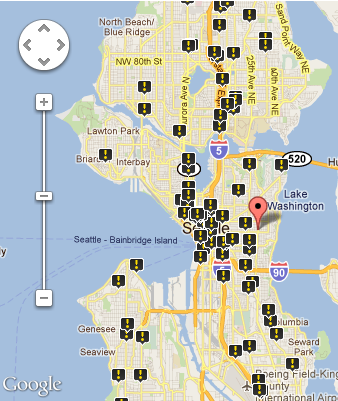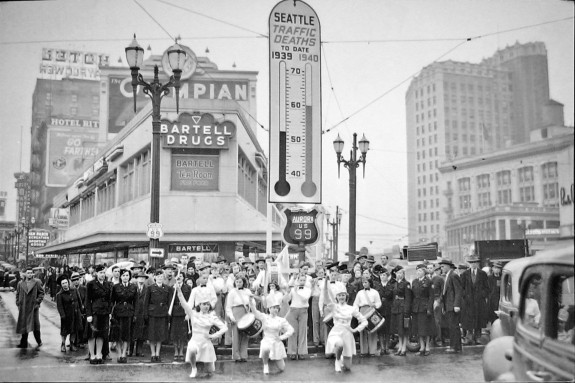
Almost all of Seattle’s streets are city-owned and operated. Yet one third of the people who die while walking in our city are killed on federal and state highways, Walking in Seattle reports:
Of the 104 pedestrians that were killed in Seattle during that period, 31 were killed on state or federal highways. While these roadways only cover a small portion of the city, nearly one third of Seattle’s pedestrian fatalities occured there.
By far the deadliest roadway in the city is I-5, with 17 fatalities during the studied period. While most people in their right mind would not consider trying to walk along or across I-5, the freeway cuts a deep path through the city and offers pedestrians no way across for long stretches.
— Advertisement —
SR-99 / Aurora is the worst state highway in the city, with 7 pedestrian deaths to its name. Other deadly roadways include SR-519 and Lake City Way / SR-522.
While the city of Seattle is responsible for these state highways, funding is not available to re-build these streets as complete streets.
In some ways, it makes sense that the most deadly streets would be the busiest ones. But it’s also shocking to realize that just a couple roads claim such a disproportionate number of lives (though it should be noted that it’s not clear and may never be clear if some of the deaths were suicides, as some of the I-5 ones likely were).
Federal and state highways through the city pose a challenge to the cause of road safety in many ways. Not only are these roads the busiest, but any changes have to go through a whole other government agency. And as we all know, it’s hard enough to get one government to agree on a change, let alone two or three.
But traffic safety on these roads has been a problem for a long time, and the state and federal government needs to make some serious changes to encourage safer roads for people on foot.
Whenever I think of Aurora traffic deaths, I can’t get this 1940 image out my head. This road has been killing people for a long time:









Comments
10 responses to “Walking in Seattle: 1/3 of Seattle pedestrian deaths occur on state and federal roads”
It’s not a war on cars, it’s a war on pedestrians, and cars against cars, and cars against bicyclists, if we judge it by who’s killing who.
Love the pic from 1940. Imagine trying to get a sign with a running tally of traffic deaths up today. The closest thing I can think of is the “Days since crash” (I think that’s what it says) sign on Hwy 2 but that’s not really a running count of deaths.
Honestly, I think it would be a great use of safe streets media campaign resources to do a traffic death count. I would also think it would be interesting if somehow each traffic death were marked with a sign or something. This could even be an opportunity for a guerrilla art project (wink, wink).
We make dangerous and deadly decisions every day because the reality of traffic deaths is cleaned up and hidden from view. Sometimes memorials are put up, but not always.
Imagine if we parked a “ghost car” near the site of every fatal collision…
Even if your stats are GROSSLY distorted, it is shocking how few roads account for so much carnage and why there is even serious discussion about things like the viaduct any more in the face of such damage.
Seems to me that the I-5 deaths and probably many of the Aurora deaths are essentially voluntary, in that they result from people attempting crossings that “…most people in their right mind would not consider…”.
We should focus our improvement efforts on those areas where even people taking reasonable care are getting hit.
Since it is illegal to walk or bike on Hwy. 99 or I-5 we should not spend a great deal of energy trying to make it safe to do so, but rather spend our energies creating safe crossing areas on these highways and safe alternate walking and biking routes.
Man, wish I’d seen this comment early enough to imagine you’d see it. Except for the Battery Street Tunnel and the Alaskan Way Viaduct, it is perfectly legal to bike on SR-99 (and as for walking, well, assuming you mean on the sidewalks that line the highway for most of its length, that’s legal too). Biking on I-5 is illegal between Lakewood and Marysville, but it’s legal for much of its length in WA. As is biking on most of our state’s highways, which is why WSDOT publishes a relatively short list of highways closed to bicyclists, as opposed to listing all the roads where it is legal.
Interstate and US routes are still maintained by the state. The only truly federal roads are on federal lands.
One error with this is that it is allocated by road-miles, rather than vehicle miles.
If you adjusted for car count, you would get a different distribution. [1]
(Indeed, on many city streets, any deaths at all would be a glaring tragedy since they are so lightly used.)
[1] None of which changes the “cuts a city apart” issue with major roadways. Whether they be highways like we have, or multi-lane surface streets, or railroad tracks, thru-ways are (a) required and (b) act like rivers or barriers which need lots of crossings.
I-405 creates similar problems, both in hazards and backups on surface streets attached to on/off ramps.
I agree with Linda and Mondoman – many deaths, especially on non-Seattle controls roads are caused by the ped inspite of all the precautions taken by drivers and DOT engineers. I really think it is amazing the numbers are so low. Not to lessen the horrible pain for any individual family, (or for the driver that might hit somebody jwalking across Aurora in the dark,) but given the number of both drivers AND pedestrians whose judgement is impaired by alcohol, or drugs, electronic distractions, cel phones, legal prescription drugs, anti depressants, etc, etc, I wouldn’t have been surprised if numbers were ten fold.